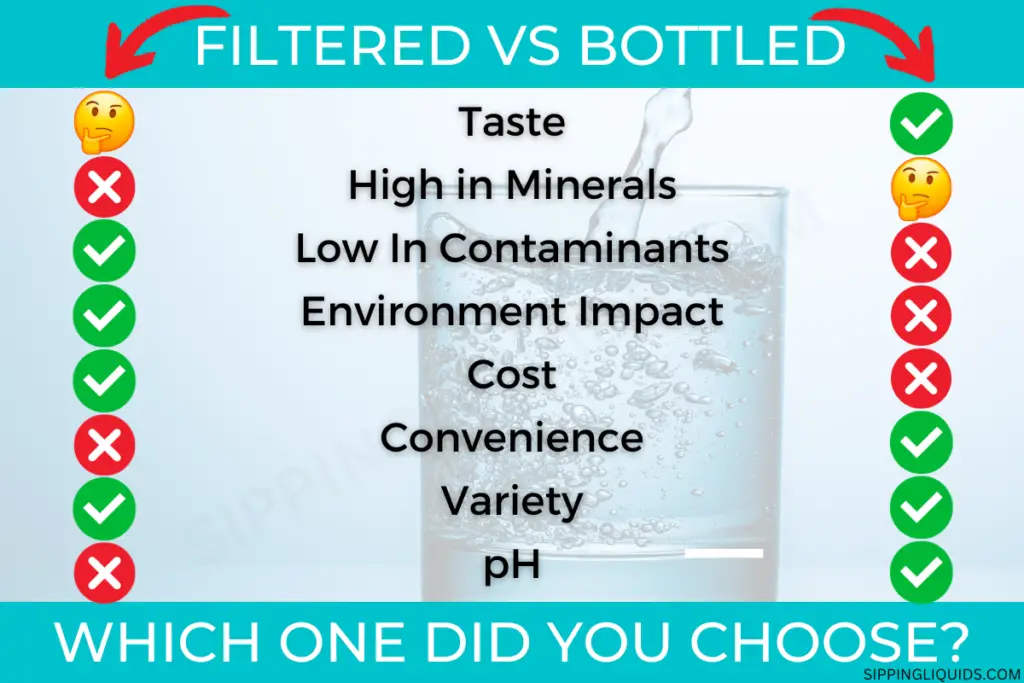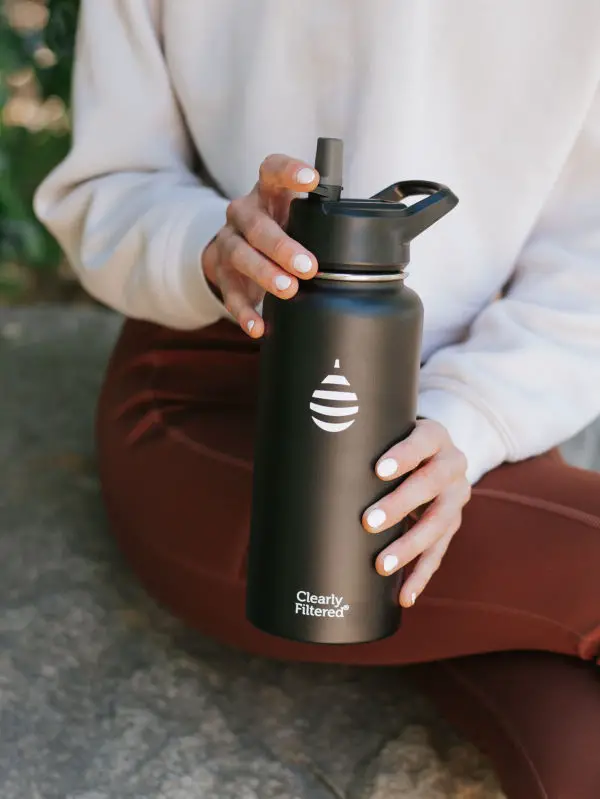Welcome to the ultimate hydration debate. We’re diving deep (pun intended!) into the taste, mineral content, contaminants, and other factors that separate bottled from filtered water.
Bottled water usually tastes better and has a higher mineral content, but filtered water is better for the environment, cheaper on the pocket and often safer to drink. For health, environment, and cost, filtered water has a slight edge over bottled.
But first, a little backstory. The trend of buying bottled water started in the 1970s, and today it’s a billion-dollar industry. Filtered water, on the other hand, has been around for centuries but modernized with the times. So, which is better?
Bottled vs. Filtered Water

1. Taste: Which one quenches your thirst?
One of the first things people notice about water is its taste. Some of us prefer the natural taste that springs and glaciers offer, while others lean towards the pure taste that filtration systems provide.
Bottled Water: The thing about bottled water is that the taste varies. Depending on its source – spring, mineral, or purified – each bottled brand has a distinct flavor. Some brands like Evian or Fiji are adored for their unique mineral profiles, while others undergo rigorous purification, which can sometimes lead to a flat taste.
For example I love Perrier water, but I can’t stand the taste of Evian – it’s just personal preference.
Filtered Water: Home filtration systems remove contaminants but can also strip water of certain minerals. This can lead to a crisp and clean taste. But, different filters lead to different taste profiles. An activated carbon filter will differ from a reverse osmosis one.
In fact, reverse osmosis and distillation are more likely to make your water taste bland or flat, while a simple activated carbon filter pitcher will barely change the taste.
2. Mineral Content: A healthy sip or just wet air?
Our bodies love minerals. In small amounts, calcium, magnesium, and potassium help our systems run smoothly. But how do bottled and filtered waters fare?
Bottled Water: Mineral content is where bottled water shines. Natural spring or mineral waters contain essential minerals. But be careful – too much of certain minerals, like sodium, may not be ideal for everyone.
You can read more about the types of spring water here.
Filtered Water: Some filters retain mineral content, but others, especially reverse osmosis systems, can remove a significant chunk. Re-mineralization stages are available in some systems to add them back in, ensuring you’re not missing out.
We have more on how you can add minerals to your water available here.
3. Contaminant Content: Purity in every drop?
Water purity is a hot topic. Nobody wants a sip full of pfas, pthalates, bacteria, or other nasties.
Bottled Water: It’s not always as pure as you think. Some brands have faced criticism over contaminants in their water. Plastic leaching is another concern, especially if bottles are stored in the sun.
Unfortunately, microplastics have been found in more than 93% of all bottled water.
Read more about whether phthalates are in your favorite brand of water here.
Filtered Water: A high-quality home filtration system can remove up to 99% of contaminants, including microplastics, chlorine, lead, and bacteria. However, filters must be changed regularly to maintain their efficiency.
There is also a large range to consider. For example, a standard Brita filter removes very little besides chlorine, while Clearly Filtered’s water filter pitcher can remove more than 365 contaminants from your water.
4. Environmental Impact: A sip towards a greener earth?
It’s essential to consider the environmental footprint of our hydration choices.
Bottled Water: Unfortunately, the bottled water industry isn’t the greenest. Plastic bottles contribute significantly to global pollution. Even though many are recyclable, not all end up in recycling bins.
Filtered Water: A more sustainable choice. Installing a filtration system means you can refill your reusable bottle multiple times, cutting down on waste. However, filters do need replacement, so there’s a minor environmental impact there.
5. Cost: Getting the best bang for your buck
Hydration shouldn’t break the bank. Let’s see which water source is kinder to your wallet.
Bottled Water: Buying bottles regularly can add up. While a single bottle might seem cheap, think about the yearly cost. Plus, premium brands can be pricey.
Filtered Water: There’s an initial investment for a filtration system, but over time, it’s cost-effective. After the setup, all you’re paying for is occasional filter replacements.
6. Convenience: The ease of a thirst-quench
When thirst strikes, you want water ASAP.
Bottled Water: It’s grab-and-go. Especially when you’re out and about, it’s a convenient choice.
Filtered Water: At home, it’s ultra-convenient. Turn on the tap, and voilà! However, if you’re out, you’ll need to have filled your bottle beforehand. Or invest in a filter bottle that you can refill on the go.
7. Types to Consider
Just as there’s a variety in bottled water, filtered water has its nuances.
Bottled Water Varieties:
- Spring Water: Directly from springs, it usually has a unique mineral profile and a smooth taste.
- Purified Water: Treated to remove chemicals and contaminants, and can taste bland.
- Mineral Water: From a geologically and physically protected underground water source. It contains at least 250 parts per million total dissolved solids, and often has a strong flavor.
Filtered Water Systems:
- Activated Carbon: Removes large particles and reduces odors. It also has little effect on the taste.
- Reverse Osmosis: Filters out contaminants by forcing water through a semi-permeable membrane, changing the taste of the water dramatically – often described as flat or bland.
- UV Filters: Use ultraviolet radiation to kill bacteria and pathogens, but doesn’t remove particle contaminants or minerals. This type of purification won’t change the taste of your water at all, but will make it safer to drink.
8. pH Levels: Striking the Balance
The pH level of water can affect its taste, feel, and potential health benefits. A balance close to neutral (pH 7) is often preferred, but there’s a market for both alkaline and acidic waters.
Bottled Water: The pH can vary a huge amount. Some brands promote alkaline water, which can have a pH over 8 and even as high as 10, claiming various health benefits. Others, especially carbonated mineral waters, may be more acidic. Always check the label if pH is a concern for you.
There’s more to alkaline water than just the pH – and you can read about it here.
Filtered Water: Most home filtration systems aim to provide water close to a neutral pH. However, certain filters, like reverse osmosis, can slightly lower the pH, making the water mildly acidic. Some modern systems come with re-mineralization stages to balance out the pH.
In the battle between bottled and filtered water, the winner really depends on your priorities. If you cherish taste and mineral content and are always on the go, bottled might be your best bet. However, if you’re looking for purity, sustainability, and long-term cost savings, a filtration system is a solid choice.
Remember, the best water is the one that keeps you hydrated, healthy, and happy. Cheers to your next refreshing sip!
The Best Water Filter Bottle We’ve Ever Used
Clearly Filtered | Stainless Steel Filter Bottles
We really love these filter bottles for keeping your drinks cool and contaminant free! They remove 99.9% of over 220 contaminants and use BPA-free plastics and double-walled stainless steel to produce some awesome looking designs with numerous bottle sizes for every situation. You can find them here at Clearlyfiltered.com

